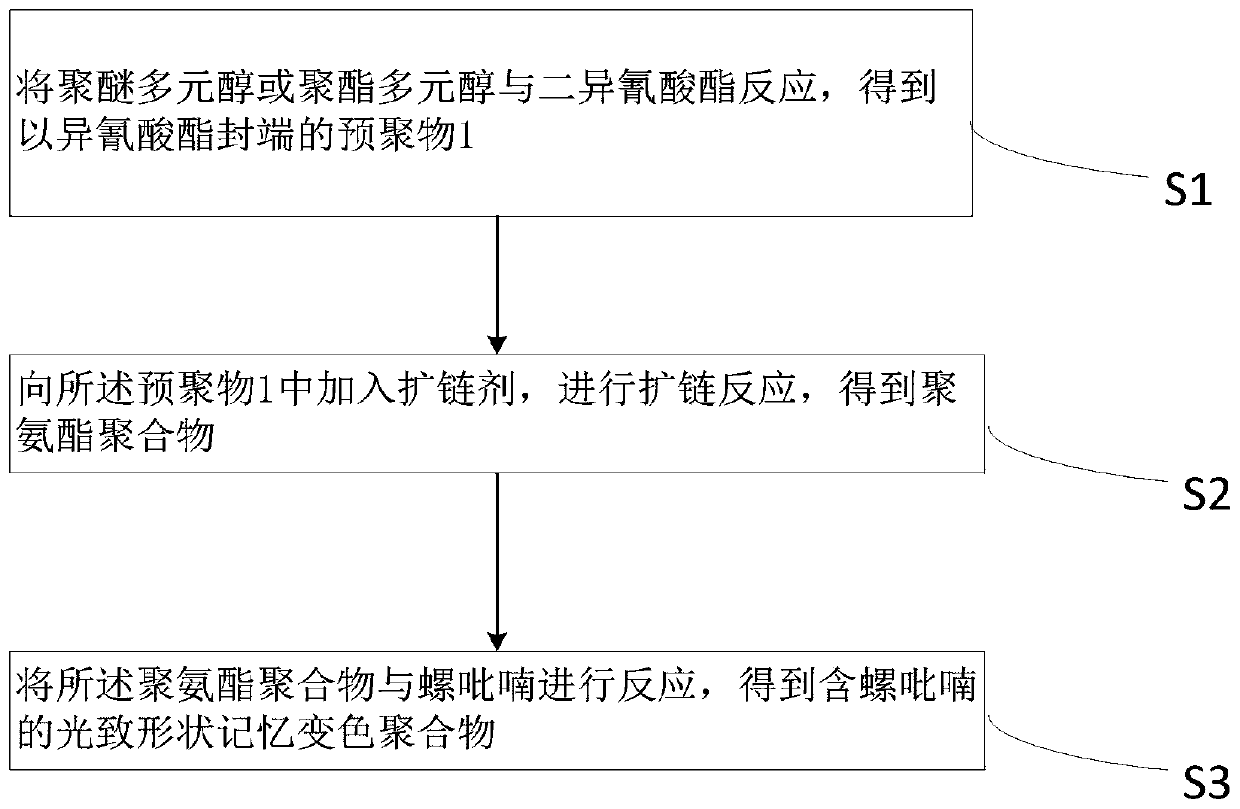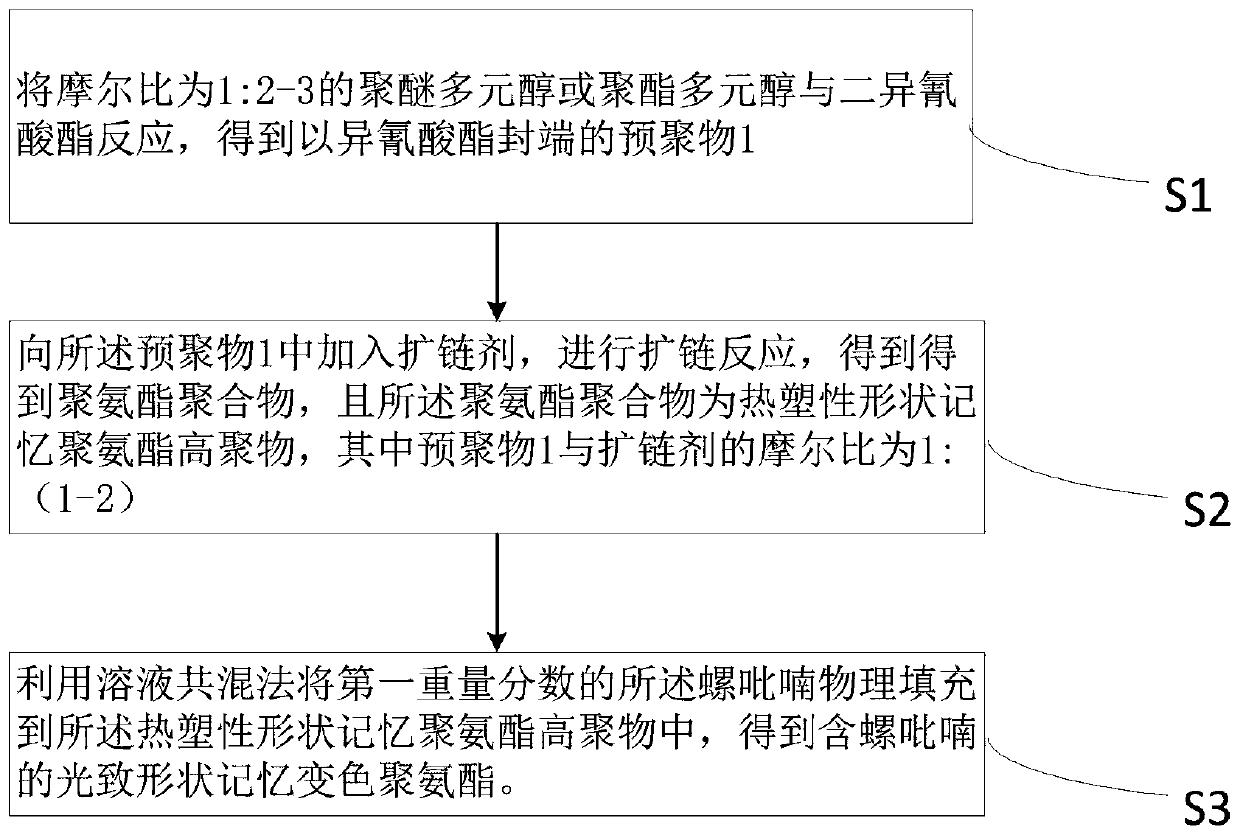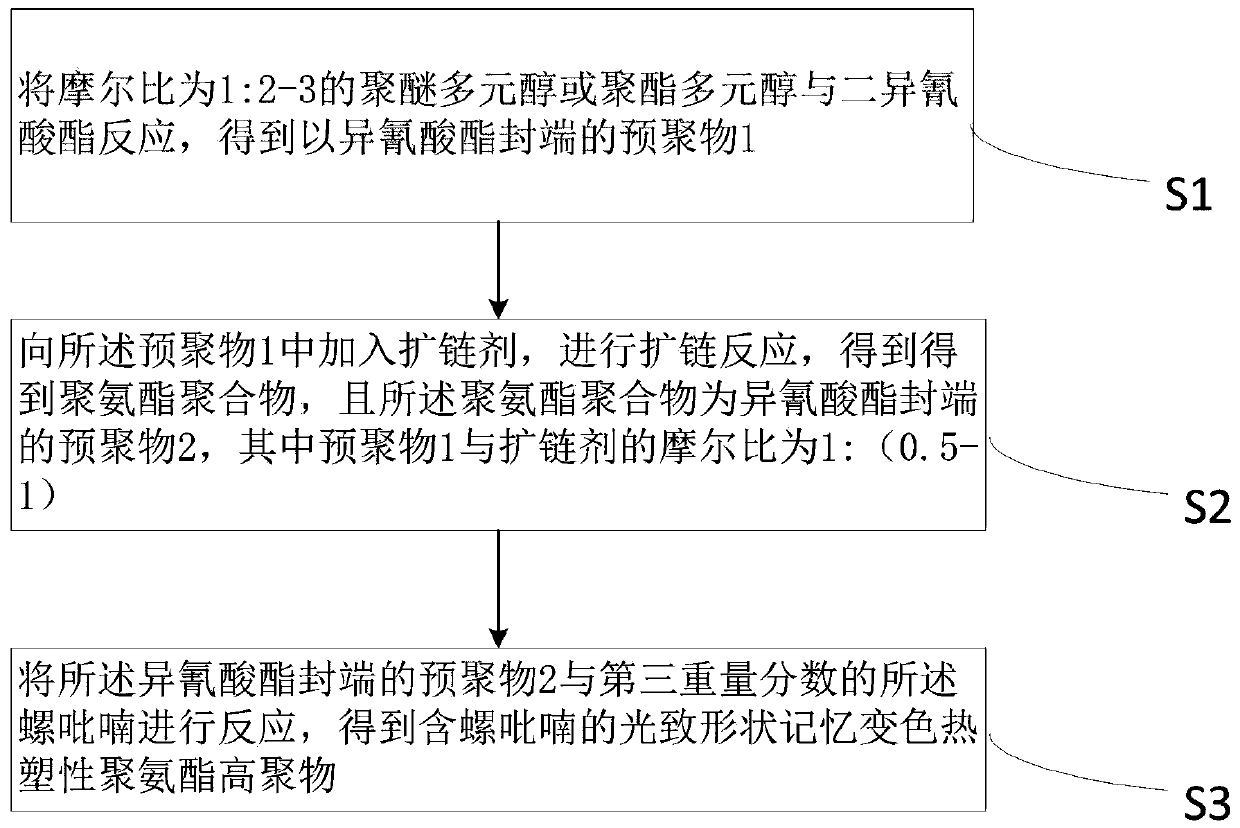Spiropyrane-containing photoinduced shape memory discoloration polymer and preparation method thereof
A photoinduced shape memory and spiropyran technology, applied in the field of functional polymer preparation, can solve the problems of biological tissue damage, limit the application range of shape memory materials, limit the application range, etc., and achieve the effect of good shape fixation rate
- Summary
- Abstract
- Description
- Claims
- Application Information
AI Technical Summary
Problems solved by technology
Method used
Image
Examples
preparation example Construction
[0040] Such as figure 1 As shown, the embodiment of the present invention provides a preparation method of a photo-induced shape memory color-changing polymer containing spiropyran, comprising the following steps:
[0041] Step S1, reacting polyether polyol or polyester polyol with diisocyanate to obtain a prepolymer 1 terminated with isocyanate;
[0042] Step S2, adding a chain extender to the prepolymer 1 to perform a chain extension reaction to obtain a polyurethane polymer;
[0043] Step S3, reacting the polyurethane polymer with spiropyran to obtain a photochromic shape memory polymer containing spiropyran.
[0044] Preferably, the molar ratio of polyether polyol or polyester polyol and diisocyanate described in step S1 is 1:2-3, can make polyether polyol or polyester polyol and diisocyanate fully react, obtain isocyanate End-capped prepolymer 1, raw materials react fully, avoiding waste of raw materials.
[0045] Preferably, in step S2, 0.5-2 moles of a chain extender a...
Embodiment 1
[0070] Such as figure 2 and Figure 6 As shown, this embodiment provides a preparation method of a photo-induced shape-memory color-changing polymer containing spiropyran, comprising the following steps:
[0071] Step S1, add 10-30g of polytetrahydrofuran ether glycol (PTMEG) and 10-30g of N,N-methyleneformamide (DMF) successively in a dry three-necked flask, then lap the experimental device, and pass nitrogen and Condensed water, adjust the stirrer speed to 250r / min. Slowly add 5-20g of diphenylmethane-4,4,-diisocyanate (MDI) dropwise within 5 minutes, add 5% dibutyltin dilaurate (DBTDL) after stirring for 15 minutes, raise the temperature of the oil bath to 50-80°C, continue React for 1-2h to obtain the prepolymer 1 terminated with isocyanate, named as PTMEG-MDI; wherein, polytetrahydrofuran ether glycol (PTMEG) can be polytetrahydrofuran ether glycol (PTMEG-2000), polytetrahydrofuran ether glycol ( PTMEG-3000), polytetrahydrofuran ether glycol (PTMEG-4000) or polytetrah...
Embodiment 2
[0075] The difference between this embodiment and embodiment 1 is:
[0076] In step S1, diphenylmethane-4,4,-diisocyanate (MDI) can use toluene diisocyanate (TDI), 1,6-hexamethylene diisocyanate (HDI), isophorone diisocyanate (IPDI), benzene Substitution of dimethylene diisocyanate (XDI), naphthalene-1,5-diisocyanate (NDI), methylcyclohexyl diisocyanate (HTDI) or dicyclohexylmethane diisocyanate (HMDI);
[0077] In step S2, 1,4-butanediol can be replaced by 1,6-hexanediol, diethylene glycol, neopentyl glycol, sorbitol or diethylaminoethanol;
[0078] Wherein, the catalyst dibutyltin dilaurate (DBTDL) can be replaced by stannous octoate, lead octoate, cobalt octoate, iron octoate, organic bismuth or organic tin.
PUM
 Login to View More
Login to View More Abstract
Description
Claims
Application Information
 Login to View More
Login to View More - Generate Ideas
- Intellectual Property
- Life Sciences
- Materials
- Tech Scout
- Unparalleled Data Quality
- Higher Quality Content
- 60% Fewer Hallucinations
Browse by: Latest US Patents, China's latest patents, Technical Efficacy Thesaurus, Application Domain, Technology Topic, Popular Technical Reports.
© 2025 PatSnap. All rights reserved.Legal|Privacy policy|Modern Slavery Act Transparency Statement|Sitemap|About US| Contact US: help@patsnap.com



